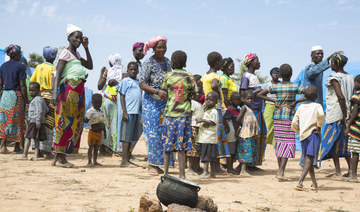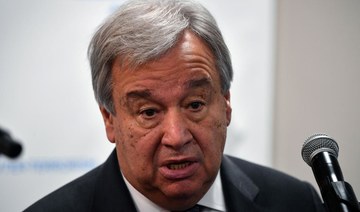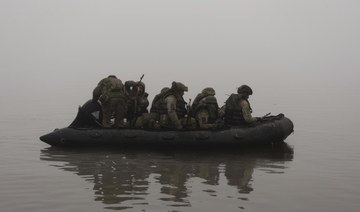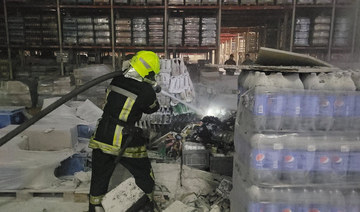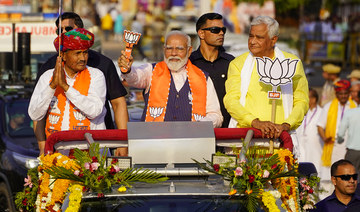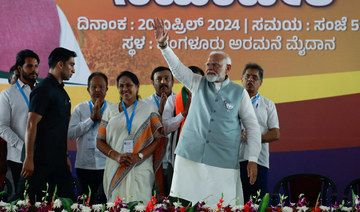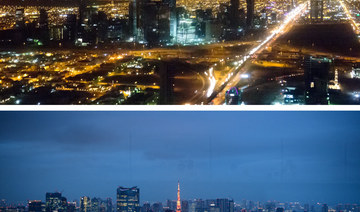ON THE MALI-BURKINA BORDER, Burkina Faso: It was the heart of the forest and there, in a marsh, lay a carpet of water lilies, their delicacy unveiled in the dawn light.
But the beauty belied the danger — the Tofa Gala forest, on Mali’s lawless border with Burkina Faso, was a haven for ruthless militants.
Guns in hand, French troops advanced on one side of the marsh, and their counterparts from Burkina Faso on the other.
Their goal: Assert control over an area where no troops had set foot for over a year.
Named Bourgou IV, the mission was the first official joint ground operation between the French army and the so-called G5 Sahel force, which pools troops from Burkina Faso, Chad, Mali, Mauritania and Niger.
In an exercise earlier this month, some 1,400 soldiers, 600 of them French, were deployed in the volatile region.
For militants, “it’s an ideal area to hide and handle logistics,” said Thibauld Lemerle, a French colonel.
Thousands of civilians and soldiers have died in violence across the Sahel which began when armed Islamists revolted in northern Mali in 2012.
The conflict has since swept into the center of Mali and spilled into neighboring Burkina Faso and Niger, inflaming ethnic tensions along the way.
Many thousands have fled their homes.
Belonging to a mosaic of groups from Al-Qaeda to Daesh and Ansarul Islam, the militants have exploited ethnic divisions and a feeling of abandonment to enmesh themselves in local communities.
France has some 4,500 troops in the region and the G5 Sahel force has a projected total of 5,000 — a goal clouded by chronic funding, training and equipment problems.
They play a game of cat and mouse in this vast territory with a highly mobile enemy, able to vanish into the desert.
“They are here but hidden, we search for them but can’t find them,” said a non-commissioned officer, assault rifle in hand. “This is an impossible war.”
A detonation occurred — a warning shot from one of the Burkinabe soldiers as a local passed by.
The troops walked on. They discovered two abandoned motorbikes suspected of belonging to militants and impounded them.
They marched for hours and find nothing.
“It’s like looking for a needle in a haystack, he could be here, he could already be gone. Shooting can start without warning,” said a lieutenant who gave his name as Julien.
The soldiers marched on. Ahead, six huts stood in the blazing sun and women and children clustered beneath an acacia tree. There were no men in sight.
The French troops searched the huts in silence. One cut open a mattress while another shakes mats.
“We’re looking for means of communication and components used to make IEDs,” said Pierrick, the head of the search party, referring to roadside bombs.
The troops found a few phones and set off on their two-hour hike to get back to their vehicles.
“We can’t search like that, cutting up mattresses, see how those people were looking at us,” one private from the search party said later, going over the events of the day.
“But it’s the only way,” another private said. “Imagine if a phone were hidden in the mattress.”
A French officer explained the rationale behind the search missions. In areas under militant influence, he said, “everyone can be a potential enemy.”
Caught between a rock and a hard place, locals pay a tough price.
Malian and Burkinabe forces have several times been accused of alleged human rights abuses. French forces are told to uphold strict rules of engagement.
The French army says there are mechanisms in place during joint operations to prevent incidents.
But a French official, who declined to be named, said that their partners do not always respect the rules.
The French and Sahel armies also differ widely in terms of equipment, which has its upsides and downsides.
One French officer said that French troops trundle slowly in armored vehicles but the Sahel troops zip around on motorbikes.
A Burkinabe officer said the French security measures and loud convoys offer the militants time to escape. “It’s normal that the French never find anything when they arrive,” he said. “With our motorbikes, we’re more mobile.”
But African troops are also far more exposed. Only days earlier, two Burkinabe soldiers riding a motorbike were killed by a roadside bomb.
In total some 170 Sahel soldiers have been killed since September in presumed militant attacks, including about 40 Malian soldiers who died in a single ambush in November.
One French soldier, by comparison, has died.
Despite years of training by French forces, the Sahel armies struggle with many problems.
Captain Wendimanegde Kabore, a Burkinabe unit commander, said that securing food and water was especially difficult. On many evenings, Burkinabe troops go to their French counterparts for a ration pack.
The arduous march is lightened at times.
French intelligence intercepted a message from one of the heads of Ansarul Islam just a few kilometers from the Bourgou operation’s positions.
The army sent out 80 French soldiers in a bid to capture him, supported by drones and a Mirage 2000 warplane.
And toward the end of the same day, forces also caught wind of local informants who tip off the militants about army troops.
An armored convoy took off in a cloud of dust, arriving at the village. Three men fled and threw objects into the undergrowth. One was arrested several minutes later.
Dressed in old jogging trousers and a sports vest, he stayed quiet.
“We took a telephone. He ran away when we arrived but the inhabitants stayed put, which is suspicious,” said Julien, the lieutenant. “But we have nothing on him, so we’re going to let him go.”
About a hundred phones were confiscated over two weeks of Bourgou IV operations. Troops withdrew from the area on November 17.
Twenty-four people were killed or captured, according to the French army, and about 60 motorbikes seized.
Despite these seemingly meager returns, military chiefs said they were pleased with the results, arguing that the operation had disrupted the militants and caused many to flee.
“Not every day is a rendezvous with glory,” said Col. Raphael Bernard. “But we work together, we shake things up and we fight.”
French and Sahel soldiers step up campaign against militants
French and Sahel soldiers step up campaign against militants
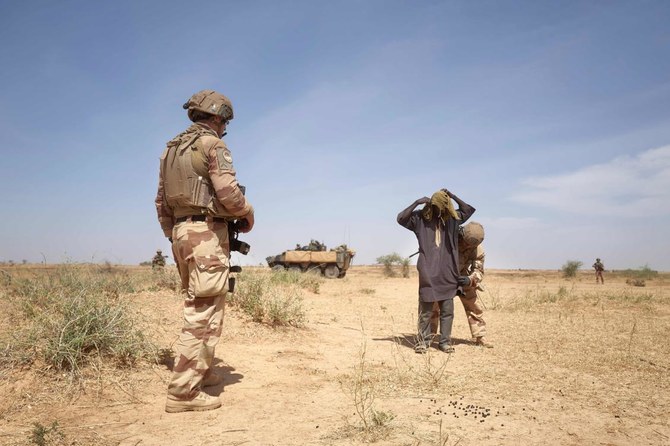
- Named Bourgou IV, the mission was the first official joint ground operation between the French army and the so-called G5 Sahel force
- In an exercise earlier this month, some 1,400 soldiers, 600 of them French, were deployed in the volatile region
UK police make fourth arrest after migrant deaths off France
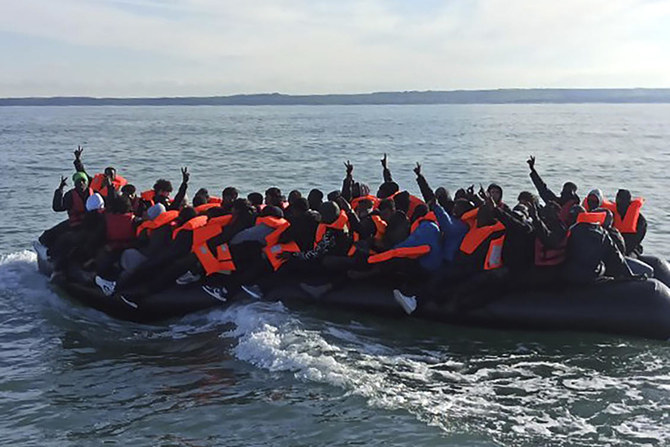
The latest arrest took place at Manston in Kent, southeast England, and the suspect was taken into custody for questioning
LONDON: UK police said Thursday that they had arrested another man after five migrants, including a child, died this week trying to cross the Channel from France.
The National Crime Agency (NCA) said it arrested an 18-year-old from Sudan late Wednesday on suspicion of facilitating illegal immigration and entering the UK illegally.
The arrest came as part of an investigation into the Channel small boat crossing which resulted in the deaths of five people on a French beach on Tuesday.
The NCA detained two Sudanese nationals aged 19 and 22, and a South Sudan national, also 22, on Tuesday and Wednesday, also on suspicion of facilitating illegal immigration and entering the UK illegally.
The 19-year-old has been released without charge, and is now being dealt with by immigration authorities, said the NCA.
The latest arrest took place at Manston in Kent, southeast England, and the suspect was taken into custody for questioning.
Three men, a woman and a seven-year-old girl lost their lives in the early hours of Tuesday in the sea near the northern French town of Wimereux.
They had been in a packed boat that set off before dawn but whose engine stopped a few hundred meters from the beach.
Several people then fell into the water. About 50 people were rescued and brought ashore but emergency services were unable to resuscitate the five.
Fifteen people have died this year trying to cross the busy shipping lane from northern France to southern England, according to an AFP tally.
That is already more than the 12 who died in the whole of last year.
Belgian agency aid worker dies in Gaza — minister
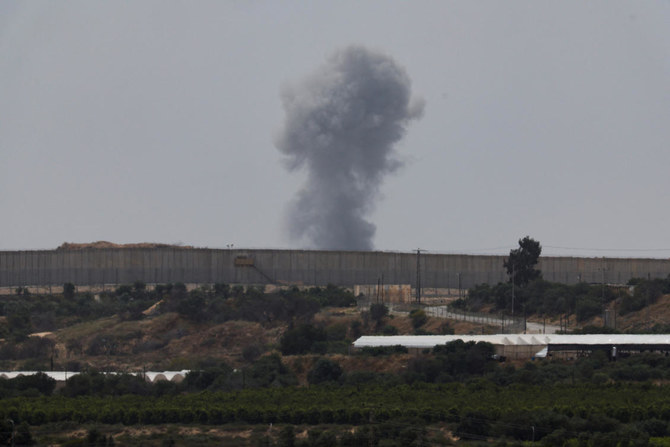
BRUSSELS: An aid worker who was part of Belgium’s development aid efforts in the Gaza Strip died in an Israeli strike on Rafah, the country’s development minister, Caroline Gennez, said on Thursday.
“It is with deep sadness and horror that we learn of the death of our colleague Abdallah Nabhan (33) and his seven-year-old son Jamal, last night, following a bombardment by the Israeli army in the eastern part of the city of Rafah,” the minister said in a statement.
Nabhan, whose nationality was not disclosed, worked for the Enabel agency, assisting small businesses.
The statement said at least seven people were killed by the strike on a building that housed about 25 people, including displaced people from other parts of the Gaza Strip occupied by Israeli forces following an attack on Israel by Hamas last October.
“The indiscriminate bombing of civilian infrastructure and innocent civilians goes against every international and humanitarian law and the rules of war,” Gennez said.
Ukraine, Russia exchange fire, at least seven dead
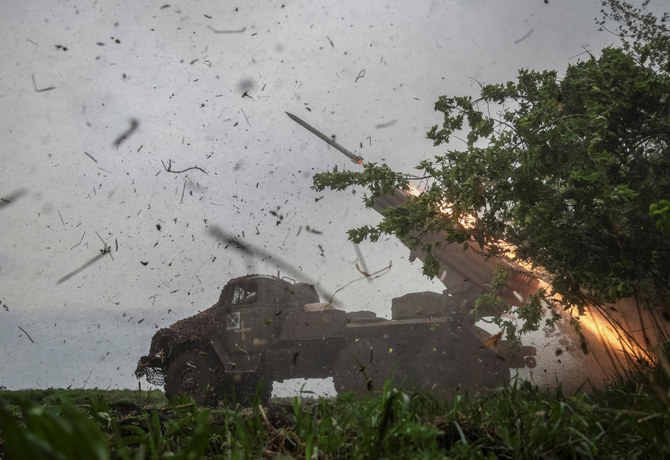
- The uptick in civilian deaths came as Russian forces are pressing in hard in the eastern Donetsk region of Ukraine
- A Ukrainian attack drone left two dead in Zaporizhzhia and two more were killed by Ukranian artillery fire in Kherson
MOSCOW: Ukrainian and Russian forces exchanged drone and artillery fire on Thursday, leaving at least seven dead, regional officials on both sides of the frontline announced.
The uptick in civilian deaths came as Russian forces are pressing in hard in the eastern Donetsk region of Ukraine, ahead of events in Moscow on May 9, hailing the Soviet Union's victory in World War II.
A Ukrainian attack drone left two dead in the southern region of Zaporizhzhia and two more were killed by Ukranian artillery fire in the southern Kherson region, officials said.
The Kremlin claimed to have annexed both regions in late 2022 even though Russian forces are still battling to gain full control over them.
"A man and a woman were killed as a result of a strike on a civilian car. Their four young children were orphaned," the Russian-installed head of Zaporizhzhia, Evgeny Balitsky, wrote on social media.
He said the children would be taken into care and provided with psychological assistance.
The Russian head of the Kherson region, Vladimir Saldo, said separately that two more people were killed by Ukrainian fire in the village of Dnipryany.
The two frontline regions saw intense bouts of fighting in 2022 and the summer of 2023, when Ukraine launched a counteroffensive that failed to meet expectations in Zaporizhzhia.
The brunt of the fighting has since moved to the eastern Donetsk region, which is also claimed by Moscow as Russian territory.
The Ukrainian head of the Donetsk region, Vadim Filashkin, said three people had been killed in separate bouts of shelling in the villages of Udachne, where two people were killed, and in Kurakhivka, where one person was killed.
"The final consequences of the shelling have yet to be determined," he said.
Keralites in Gulf take ‘vote flights’ to join India’s mammoth polls
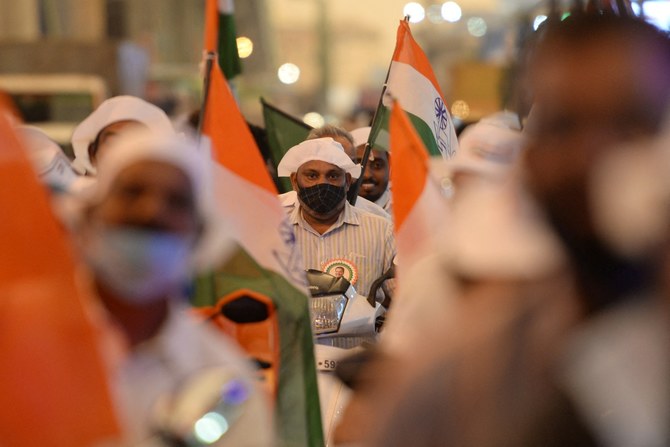
- ‘Vote flights’ are special chartered flights bringing Keralites home to cast ballots
- Kerala is the single main place of origin of Indian expats living in Gulf countries
NEW DELHI: Tens of thousands of Keralites working in Gulf countries are flying home to cast their ballots as the southern Indian state opens for voting on Friday in the world’s biggest general election.
India’s seven-phase polls started on April 19 and take place over the next six weeks, with more than 968 million people registered to vote.
Some states are completing the process in a day, and others have it spread out in several phases. Kerala is joining other 12 states, which according to the schedule go to the polls on April 26.
Indian nationals living overseas have been allowed to vote since 2011 and have to register with both the Election Commission of India and Indian embassies in their countries of residence. Their names will then appear on the voters’ list, but to cast their ballots, they still need to be physically present in their constituencies.
India has one of the world’s largest diasporas, especially in GCC countries, where at least 9 million Indian expats live and work. The southwestern coastal state of Kerala is the single main place of their origin. Some 3.5 million Keralites reside in Saudi Arabia, Oman, Kuwait, Qatar, Bahrain and the UAE.
“I think about 30,000 people have come from Saudi Arabia alone to vote. Not all of them have come on ‘vote viman’ (vote flights). Some have also come by regular flights,” said Iqbal Cheri, a marketing professional working in Dammam, who reached Kerala on Thursday.
Cheri referred to the flights that have been bringing citizens home to participate in Friday’s polls.
“They bring voters only and they are mostly chartered flights,” he said. “We have come here to vote and save our democracy and secularism. It’s an important election and we all need to vote to save the nation.”
His compatriot, Shareef Chola Paramdil, who works as a marketing head of a hospital in Dammam, said these election flights have been bringing Saudi Arabia-based Kerala voters home for the past few days.
“Last week, also three chartered flights came from Saudi Arabia,” he said.
“People who come on the chartered flights pay less compared to the regular flights, as group booking brings down the fare. Besides, these people don’t get more than a few days of leave. So, they come and cast their votes and leave the next day.”
There are 543 contested seats in the lower house of parliament. The party or coalition that wins at least 272 is going to form the government. The state of Kerala will contribute 20.
For Paramdil, the election is particularly important as a Muslim because incumbent Prime Minister Narendra Modi and his ruling Bharatiya Janata Party have been accused by the opposition and minority groups of marshaling majoritarian Hindu sentiment.
Critics say that India’s tradition of diversity and secularism has been under attack since Modi took power a decade ago and that his party has been fostering religious intolerance and discrimination.
“We want a government that does not discriminate in the name of religion, and we have been troubled by the politics of division that the government in Delhi has been practicing ever since it came to power in 2014,” Paramdil said.
Both Keralite Muslims and Hindus — like Gokul Padnabhan, a Kuwait-based professional in the oil and gas industry — see the election as an important exercise of their democratic rights.
“It’s very important to be here this time. That’s why I came for the vote,” Padnabhan said. “The vote will help us find the right person to rule us for the next five years.”
One of the organizations helping expat voters charter flights in Gulf countries is the Kerala Muslim Cultural Centre, an overseas wing of the Indian Union Muslim League.
“I feel around 100,000 people have come from the Gulf region to vote in this election,” said Ahamed Saju, head of the IUML’s student federation.
“Why they came is because this is a very crucial election this time ... Each and every vote is important. So, they thought that this time to protect our democracy, protect our constitution, protect our values and protect our secular credentials and the secular fabric of the country.”
Bangladeshis pray for rain as heatstroke deaths rise
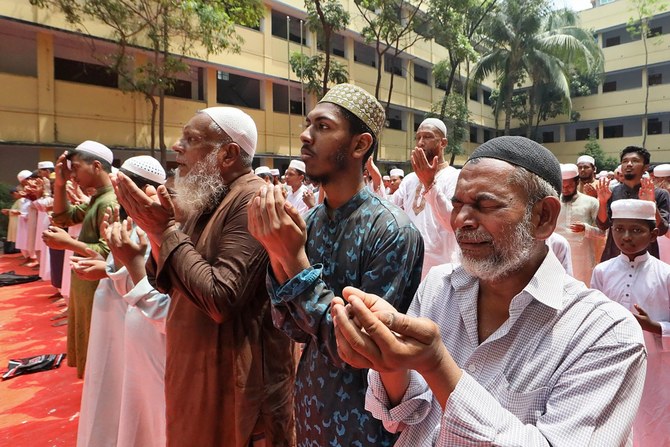
- Country is reaching limit of adaptability to extreme weather, report warns
- Heatwave has shut schools for 33m Bangladeshi children
DHAKA: Thousands of Bangladeshis have gathered in Dhaka to pray for rain in the middle of an extreme hot spell that has put health authorities on heatstroke alert.
The weather across the region is usually hot across the region in April before the summer monsoon season, but this year temperatures have been unusually high, reaching 42 degrees Celsius in parts of Bangladesh.
The country has been on alert since last week, as the punishing heatwave has disrupted agriculture, raised the risk of health complications and forced schools to close for 33 million children.
As the Bangladesh Meteorological Department renewed its warning that the heatwave is likely to persist during the weekend — or until a new notice is issued — thousands of people in Dhaka prayed on Wednesday and Thursday for relief.
They gathered in city mosques and rural fields to pray for rain.
“Special prayers for rain have been organized in many parts of Dhaka on Thursday. Thousands of people joined these prayers ... in addition to that, a special prayer for rain, which Muslims around the world have practiced since the days of the Prophet Muhammad, has taken place in many parts across the country,” Motiur Rahman Akand, spokesperson of the Bangladesh Jamaat-e-Islami, the country’s largest religious political party, which organized the prayers, told Arab News.
“When there is a natural crisis, especially drought, which causes severe suffering for human beings and all other living creatures, people should seek help from the Almighty to get relief from this situation.”
Hospitals were on high alert as at least 20 people died from heatstroke in the past five days alone.
“We have been preparing quite ahead for managing heatwave-related patients ... all the government health facilities are guided not to admit any other patients unless it’s an emergency,” Dr. Moinul Ahsan, director of the hospital wing of the Directorate General of Health Services, told Arab News.
“We are on alert and monitoring the situation closely. Working-class people are suffering most amid this heatwave ... children, pregnant women and the elderly are also most vulnerable in this situation.”
Bangladesh’s geography and low-lying delta topography make it particularly vulnerable to the adverse effects of climate change, and for the past two decades, the country has launched various environmental schemes to mitigate the worsening situation.
Ranking among the 10 countries most prone to climate devastation, Bangladesh has been recognized as a global leader in adaptation and resilience, and in 2005 was one of the first least-developed countries to launch a national adaptation program of action.
A report released in February by the International Centre for Climate Change and Development, a leading research institute in Dhaka, warned that Bangladesh is reaching the limit of its ability to adapt to extreme weather.




